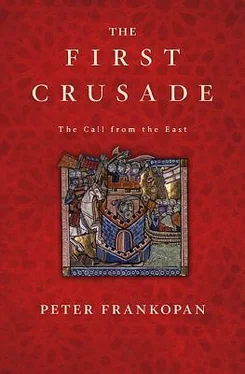After limited operations in Bithynia, therefore, Alexios approached Sulayman in the summer of 1081 and came to an agreement with him. Lavish gifts were presented by the emperor in return for setting a boundary at the river Drakon beyond which the Turks were not allowed to encroach. Sulayman was effectively appointed as the emperor’s representative in western Asia Minor, with the remit not only to prevent incursions of his own men, but of all Turks in this region. 22Additionally, Alexios received a commitment that military assistance would be provided as, where and when it was needed. When the emperor found himself overstretched near Larissa in 1083, struggling to relieve a Norman siege of the town, ‘he called on [Sulayman] to supply forces with leaders of long experience. The request was answered without delay: 7,000 men were sent along with highly skilled officers.’ 23Turkish auxiliaries who fought alongside him against the Normans on other occasions in the early 1080s may likewise have been supplied by Sulayman. 24
Alexios gained much from the agreement. It left him free to deal with the troubles in the western provinces being caused by Normans and Pechenegs. It also provided him with the security of knowing that he had not inadvertently provided a platform from which an ambitious Byzantine aristocrat might mount a challenge against his rule. Best of all, however, was the fact that Sulayman proved to be an outstanding ally.
For one thing, the truce agreed in 1081 was extremely effective. Turkish raids on Byzantine territory were brought to an immediate end, with the peace agreement diligently enforced by Sulayman. As a message from the sultan of Baghdad to the emperor reveals, the treaty concluded between Alexios and Sulayman remained intact until at least the middle of 1085 and possibly later still. 25It provided the basis for stability in Asia Minor at a time when the empire was elsewhere teetering on the brink of collapse. Indeed, it appears that the agreement brought further benefits to the emperor that were not limited to western Asia Minor alone. A chronicler from the Caucasus noted that soon after terms were reached, the ‘entire country of Cilicia’ came under the control of ‘a certain emir, Sulayman, son of Kutlumush’. 26To judge from the comments of another author, writing in Syriac, this expansion of Sulayman’s power was advantageous to Byzantium. ‘In the year 475 [ad 1082]’, he wrote, ‘Sulayman departed from the territory of the Rhomaye [Byzantium] and went and captured the cities on the sea coast, namely Antarados and Tarsos.’ 27The nuance here is easy to miss: Sulayman was not attacking targets that were held by Byzantines; he was recovering towns which had fallen to the Turks. In other words, through the treaty concluded in 1081 Sulayman effectively became Alexios’ agent, securing strategically important locations in Asia Minor as the emperor’s representative.
Although the emperor’s reliance on the Turks was inspired, it was not wholly unprecedented from the wider perspective of Byzantine foreign policy. As one tenth-century manual on the craft of diplomacy makes clear, setting neighbours off against one another and hiring warlords to attack unruly enemies was an accepted way of establishing and maintaining a favourable balance with the peoples outside the empire. 28Alexios’ use of Sulayman was bold; but it was not revolutionary.
There was, however, a price to pay: Nicaea. One of the most important towns in Asia Minor, Nicaea was enviably situated, defended by vast walls and fortifications, with a lake to the west side offering additional protection, as well as its own independent water supply. Its location made it the gateway to the rich river valleys of Lycia and Phrygia and the lush western and southern coasts, as well as into the Anatolian plateau. It was a vital node through which all communication flowed between Constantinople and the Byzantine east.
The circumstances of Nicaea’s occupation by the Turks are murky. It is normally assumed that the town was lost during the failed uprising of Nikephoros Melissenos, which was contemporaneous with Alexios’ own revolt against his predecessor in 1081. A member of one of Asia Minor’s leading families, Melissenos won sweeping support as he moved towards Constantinople: ‘The inhabitants of the towns recognised him as though he were emperor of the Romans and surrendered to him’, wrote one author several decades later. ‘He in turn placed them in the care of the Turks, with the result that all the towns of Asia, Phrygia and Galatia quickly came under the sway of the Turks; [Melissenos] then took Nicaea in Bithynia with a sizeable army, and from that location sought to take the empire of the Romans.’ 29It therefore seems that Melissenos passed Nicaea – as well as many other towns of Asia Minor – into Turkish hands. Melissenos made a convenient scapegoat, however, not least since he was to cause significant problems for Alexios later in his reign and would live out the rest of his life exiled in a monastery. 30The blame attached to him is rather unconvincing: pinned too neatly by Alexios’ son-in-law, Nikephoros Bryennios, whose history was commissioned by the emperor’s wife. 31
In fact, the more natural and logical explanation for the handover of Nicaea lies in the agreement reached between Sulayman and Alexios in 1081. Just as a new governor was sent out to Dyrrakhion after Alexios took power, therefore, the appointment of someone who could be trusted as the emperor’s representative in Nicaea – and would not challenge for the throne – was an important step. The fact that a Byzantine was not immediately dispatched to the town after Alexios’ usurpation suggests that other arrangements had been made to secure Nicaea – that is, to place it in the hands of Sulayman. It is not surprising that some accounts refer to the Turk as the governor of Nicaea. 32
The decision to entrust Sulayman with Nicaea became a sensitive issue, though not because this policy backfired in the short term. The problem was that by the start of the 1090s Sulayman was dead and his successor Abu’l-Kasim proved to be a different proposition entirely. As a result, obscuring how and when Nicaea came to be occupied by the Turks became an important part of protecting the emperor’s reputation. Yet the fact that the loss of Nicaea can be traced back to none other than the emperor Alexios I Komnenos completely undermines the Alexiad ’s careful and repeated assertions that all of Asia Minor had been lost before Alexios took power.
The attempt to suppress the truth was made easier by the fact that although many histories were written in Byzantium in the eleventh and twelfth centuries, with only two exceptions, they either end at the point of Alexios’ seizure of power or begin with the reign of his son and heir, John II. 33Even after his death, it was difficult to write about Alexios, and for the most part, historians did not try. This stemmed in large part from deliberate efforts by the Komnenos family to control the image and reputation of the emperor as the founder of the dynasty. 34
Nevertheless, Alexios’ role could not be completely disguised, at least to well-informed westerners. The chronicler Albert of Aachen knew that Nicaea had been lost by Alexios, though he was not aware of the details; he was led to believe that it happened after the emperor had been tricked by the Turks. 35When Ekkehard of Aura was told that the emperor had surrendered the town to the Turks, he was appalled, accusing Alexios of committing a most disgusting crime in handing over this jewel of Christianity. Ekkehard had, though, misunderstood the situation: he thought that Alexios had given away Nicaea some time after 1097, when in reality the emperor had placed it in the hands of the Turks in 1081. 36
However, it was not in Nicaea or western Asia Minor where things began to go wrong but much further east – in Antioch. The consequences were devastating. Like Nicaea, Antioch was a vital location in the eastern half of Byzantium: a town of great economic significance, strategic value and prestige whose church was overseen by a patriarch and whose governor was one of the highest-ranking officials within the empire. 37As with Nicaea, it was essential for Antioch to be controlled by a loyal lieutenant, someone who did not seek to take advantage of Alexios’ preoccupations elsewhere to plot against him. As a commander who had proved himself time and again on the eastern frontier, Philaretos Braakhamios seemed to fit the bill. But Philaretos was an erratic and difficult figure. He was an excellent general, wrote one Byzantine historian who knew him, but he was also an impossible man who would not take orders from anyone. 38
Читать дальше











